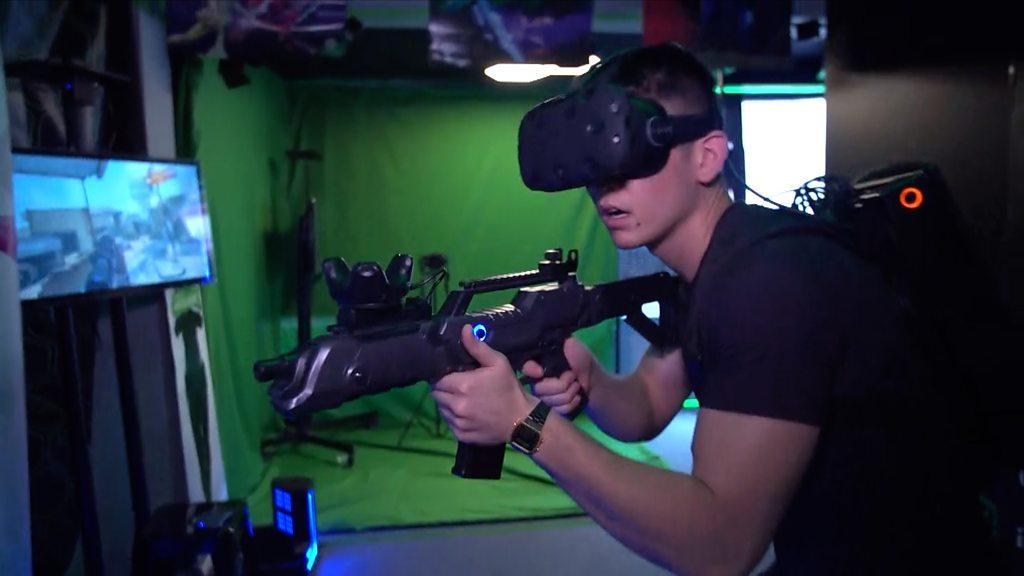PS VR2: Sony's next attempt to make virtual reality gaming mainstream
- Published

Is virtual reality the future of gaming?
It's a question that people in the industry have been arguing over for some time, with passionate views on both sides.
And there's nothing like a shiny new piece of kit to rekindle the debate.
With the release of PlayStation VR2, one of gaming's biggest players is saying that virtual reality will have a significant part to play in the industry for years to come.
Some thought Sony might abandon their virtual reality experiment after a failure to invest in many blockbuster VR games, suggesting a lack of belief in their first foray into this space.
I found the original PlayStation VR to be uncomfortable, clunky and a cable-tidier's worst nightmare.
Released in 2016, it gave players some genuine moments of joy, creating broad smiles when playing Tetris Effect for the first time. Resident Evil 7, experienced via the headset, is hands-down the most scary and traumatising gaming experience of my life.
But those memorable moments were few and far between. A lack of truly must-play games, especially ones exclusive to the device, was a problem that never got solved. Despite that, a reported five million units were sold worldwide.
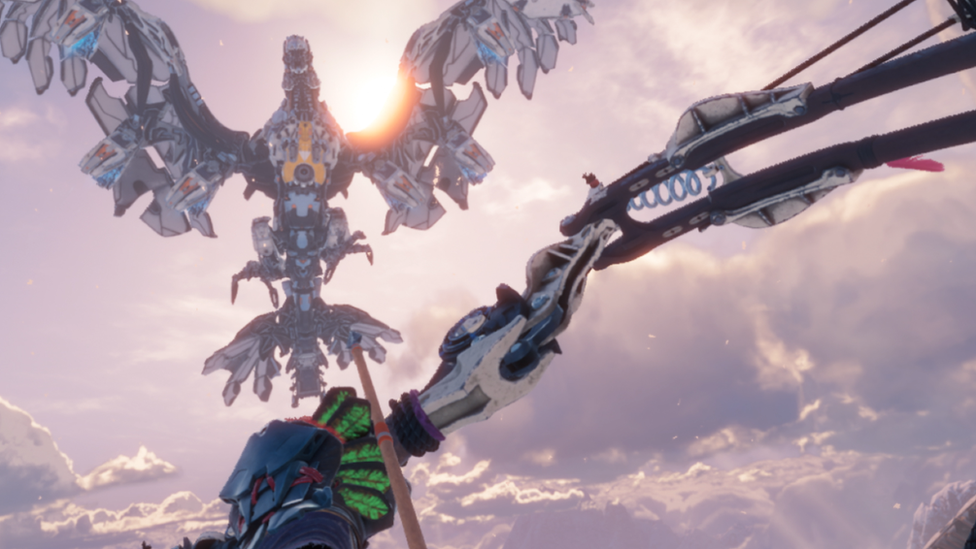
Jordan Middler says that Horizon: Call of the Mountain is a "beautiful" virtual reality experience, but argues that there needs to be more like it on the platform
The PS VR2 is an undoubtedly slicker, lighter, and more comfortable experience than its predecessor. It's looking to sandwich itself in the middle of an increasingly crowded VR marketplace.
WATCH: Virtual Reality Gaming: Is it Just a Fad?
You'll need a PlayStation 5 already to use it. If you do own one, then it's a virtual reality gaming option that is not as expensive as the high-end Valve Index (which requires a top-drawer PC to run). Yet it still offers technical performance that is more impressive than cheaper options like the Meta Quest 2 (which costs about £400).
So does its release help answer the question that has followed gaming around since Nintendo's Virtual Boy came out back in 1995? Is this what all gaming will look like in future?
Games journalist Jordan Middler from Videogames Chronicle (VGC) spent time with the device ahead of its release, external.
He says he's always wanted a better experience from VR than its been able to provide.
"From a hardware perspective it's incredible, a really impressive headset," he begins.
"The price (£529) might put some people off because it's actually more than the PS5 console itself, but for the graphical power you're getting in that headset, it's more affordable than its PC equivalents."
Last month Sony denied reports that it had significantly reduced the sales projections for the headset, external because of a disappointing number of pre-orders. It was claimed that the company expected to sell 1.5 million devices by March 2024 rather than two million.
As impressed as he is with the headset, Middler is worried that the same complaint which has dogged VR gaming from the beginning still applies now - what will people play? There's a lack of unique experiences available for the device he says.
"You're only really getting Horizon: Call of the Mountain as a true PS VR2 exclusive.
"Where are all the other big Sony titles that make the PlayStation itself so popular? Where's the Spiderman VR game or a Last of Us VR experience?"
A lack of so-called "system-sellers", titles so good they encourage people to buy new hardware just to play a particular game, is a criticism that is often aimed at many virtual reality devices.
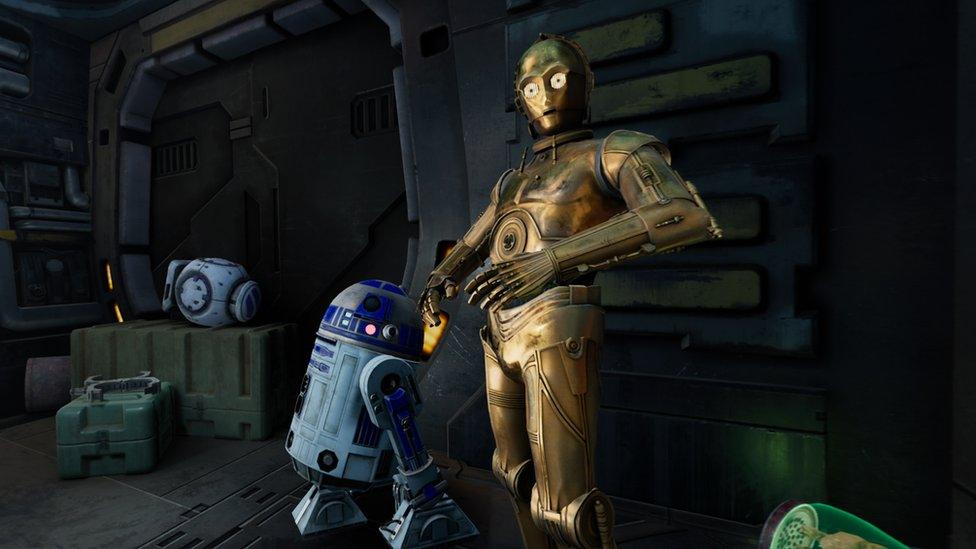
The majority of the games available on the PS VR2, like Star Wars: Tales from the Galaxy's Edge, are also available on other VR headsets
If the majority of the titles playable on the PS VR2 at the moment are also available on other headsets, why would players choose it over the rest?
"There's not much coming down the track either," says Middler.
For now, Sony is relying on their Horizon series VR tie-in to do a lot of the heavy lifting.
Horizon: Call of the Mountain may be the only significant exclusive title at launch but Middler says he is very impressed with the game, describing it as "absolutely beautiful".
The release sees you climbing up mountains and hunting with a bow and arrow in a post-apocalyptic world made famous by the character Aloy back in 2017.
"I was shocked and a little embarrassed at how quickly the game had me tensing my arms and starting to feel achy about going up a virtual mountain!" he laughs.
"It captures the scale of the machines that call this place home in a way that is comparable to scenes in Jurassic Park. There are moments when you go under a Tall Neck, which is a massive kind of mechanical giraffe, and the game really tricks your brain to make you think you're in that world.
"The gameplay backs it up as well - this isn't just a theme park experience."
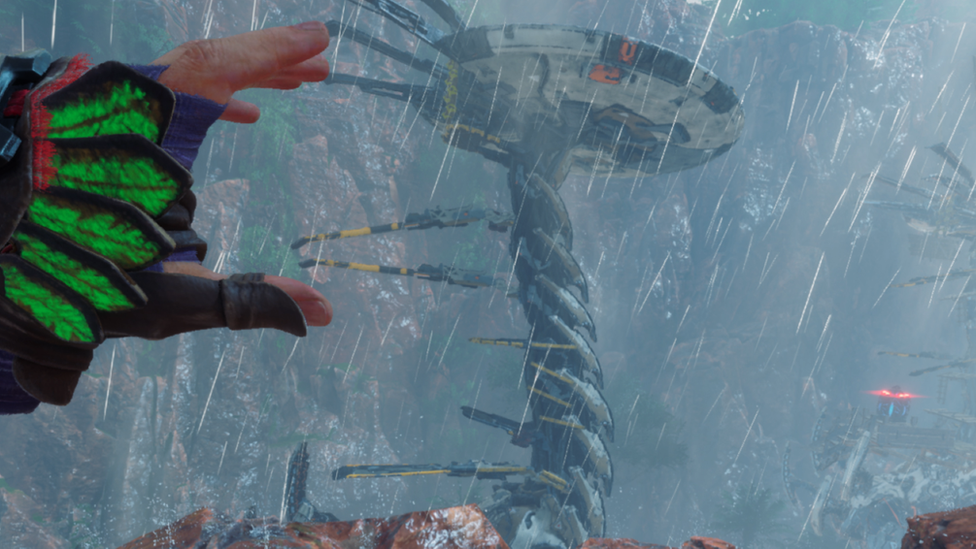
Horizon: Call of the Mountain is a spin-off of the Horizon series in which the player becomes a disgraced former soldier
Games for the original PlayStation VR are not compatible with its new sibling at the moment. This means that players who have built up a library of games for that device will need to start again if they choose to upgrade to a PS VR2, or wait to see if a solution is offered.
It's part of the the reason why Middler thinks this is a headset that will attract "the hardest of the hard-core players" who truly believe virtual reality gaming is the future.
He argues that players will have to have a "lot of faith in PlayStation" to invest time and money in making more games, given the way that the previous iteration was "abandoned" towards the end of its time.
The PS VR2 has lots of positives but poses lots of questions, too - it's a microcosm of the virtual reality gaming experience to date.
This device does not provide any definitive answers, so the role of VR in the future of gaming is likely to be a topic of conversation for those in the industry for some time to come.
For more gaming content, go to Press X to Continue,the BBC Sounds gaming Podcast.

Related topics
- Published23 February 2021
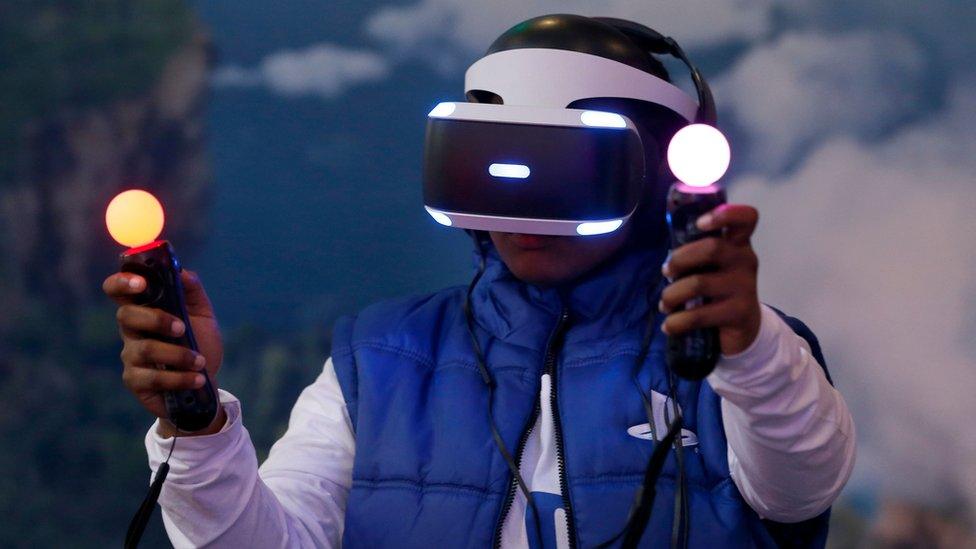
- Published27 June 2018
